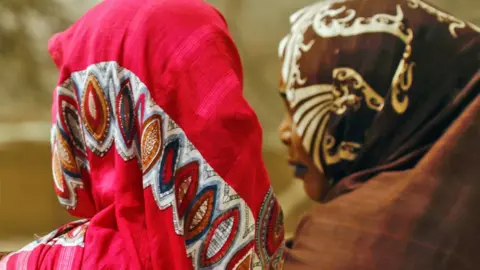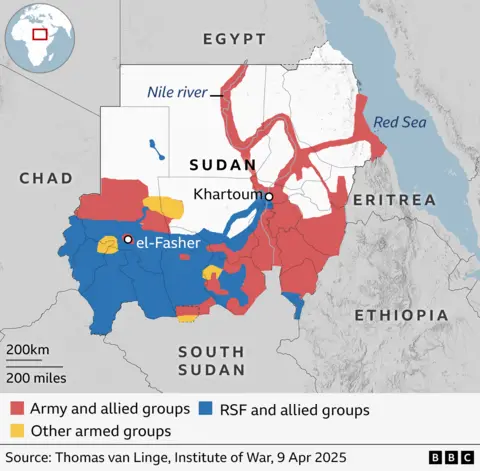'Death is everywhere': Sudan camp residents shelter from attacks
 AFP
AFPDevastating attacks on a camp hosting hundreds of thousands of people who had fled Sudan's civil war have continued for a third day, residents have told the BBC.
One person in the Zamzam camp described the situation as "catastrophic" while another said things were "dire".
More than 100 civilians, among them at least 20 children and a medical team, have been killed in a series of assaults that began late last week in Sudan's western Darfur region, the UN has said.
The attacks – on the city of el-Fasher and two nearby camps – have been blamed on the paramilitary Rapid Support Forces (RSF). On Sunday the group said it had taken control of Zamzam but denied reports of atrocities.
The camps, Zamzam and Abu Shouk, provide temporary homes to more than 700,000 people, many of whom are facing famine-like conditions.
News of the attacks comes on the eve of the second anniversary of the start of the civil war between the RSF and the army.
Contacting the BBC on Sunday morning, one Zamzam resident who works at a community kitchen providing food for those in the camp, said "a large number of young people" had been killed.
"Those who were working in the community kitchen have been killed, and the doctors who were part of the initiative to reopen the hospital were also killed," Mustafa, 34, said in a WhatsApp audio message.
"My uncle and my cousin were killed. People are wounded, and there is no medicine or hospital to save them - they are dying from bleeding.
"The shelling is still ongoing, and we are expecting more attacks in the morning."
He added that all routes out of the camp were closed and it was "surrounded from all four directions".
Another resident, Wasir, said that "nothing [was] left in Zamzam".
"A large number of civilians have fled, and we are still trying to leave, but we haven't succeeded, all the roads are blocked, and we have children with us.
"Death is everywhere. As I speak to you now from inside the trench, there is shelling happening."
Some camp residents have got out and made the 15km (nine mile) journey to el-Fasher, according to North Darfur's Health Minister Ibrahim Khater.
"I am observing many people walking from Zamzam - mostly children, women and the elderly," he said in a message to the BBC.
"Some were injured, tired and saying they lost their family - dead on the streets. The situation is catastrophic."
The UN's humanitarian co-ordinator in Sudan, Clementine Nkweta-Salami, said she was "appalled and gravely alarmed" by reports from Darfur.
"This represents yet another deadly and unacceptable escalation in a series of brutal attacks on displaced people and aid workers," she added in a statement.
The US State Department also said it was "deeply alarmed by reports of attacks by the RSF on Zamzam and Abu Shouk", adding: "We condemn the RSF's attacks on the most vulnerable of civilians."
British Foreign Secretary David Lammy, who is hosting a conference on Sudan on Tuesday, described the reports of "indiscriminate RSF attacks" as "shocking".
Aid organisation Relief International said nine of its workers "were mercilessly killed including doctors, referral drivers and a team leader" in the attack on Zamzam.
The charity, which said it was the last provider of critical health services in the camp, alleged RSF fighters were to blame.
"We understand that this was a targeted attack on all health infrastructure in the region to prevent access to healthcare for internally displaced people.
"We are horrified that one of our clinics was also part of this attack - along with other health facilities in el-Fasher."
Kashif Shafique, the charity's Sudan director, told the BBC's Newshour programme that what happened was not random.
Relaying what two surviving female members of staff had described, he said RSF fighters went into a safety bunker and shot the nine victims in the head and chest.
In a statement released on Saturday, the RSF said it was not responsible for attacks on civilians and that scenes of killing in Zamzam were staged to discredit its forces.
The following day, the group said it had completed a "successful liberation" of the camp from Sudan's army. The RSF accused the army of using Zamzam as "a military barracks, and innocent civilians as human shields".
Assessing satellite images, a team of specialists at Yale University in the US said on Friday that "this attack conservatively represents the most significant ground-based attack on Zamzam... since fighting erupted in the el-Fasher area in spring of 2024".
The Yale School of Public Health's Humanitarian Research Lab said it had observed that "arson attacks have burned multiple structures and significant areas of the camp in the center, south, and southeast portions of the camp".
The war - a power struggle between the army and the RSF - has created the world's largest humanitarian crisis, forcing more than 12 million people from their homes and pushing communities into hunger.
It began on 15 April 2023, after the leaders of the army and RSF fell out over the political future of the country.
El-Fasher is the last major town in Darfur under army control and has been under siege by the RSF for a year.

More BBC stories on Sudan:
 Getty Images/BBC
Getty Images/BBCGo to BBCAfrica.com for more news from the African continent.
Follow us on Twitter @BBCAfrica, on Facebook at BBC Africa or on Instagram at bbcafrica
